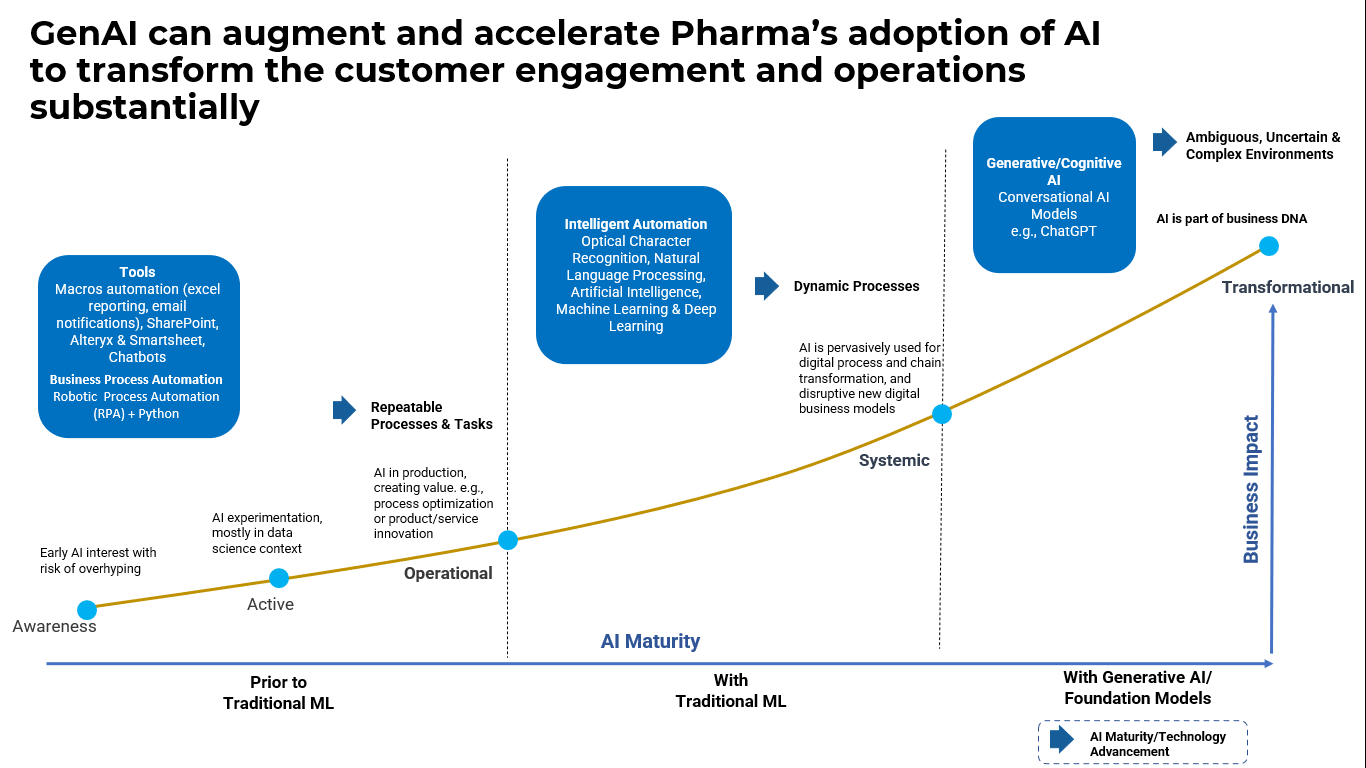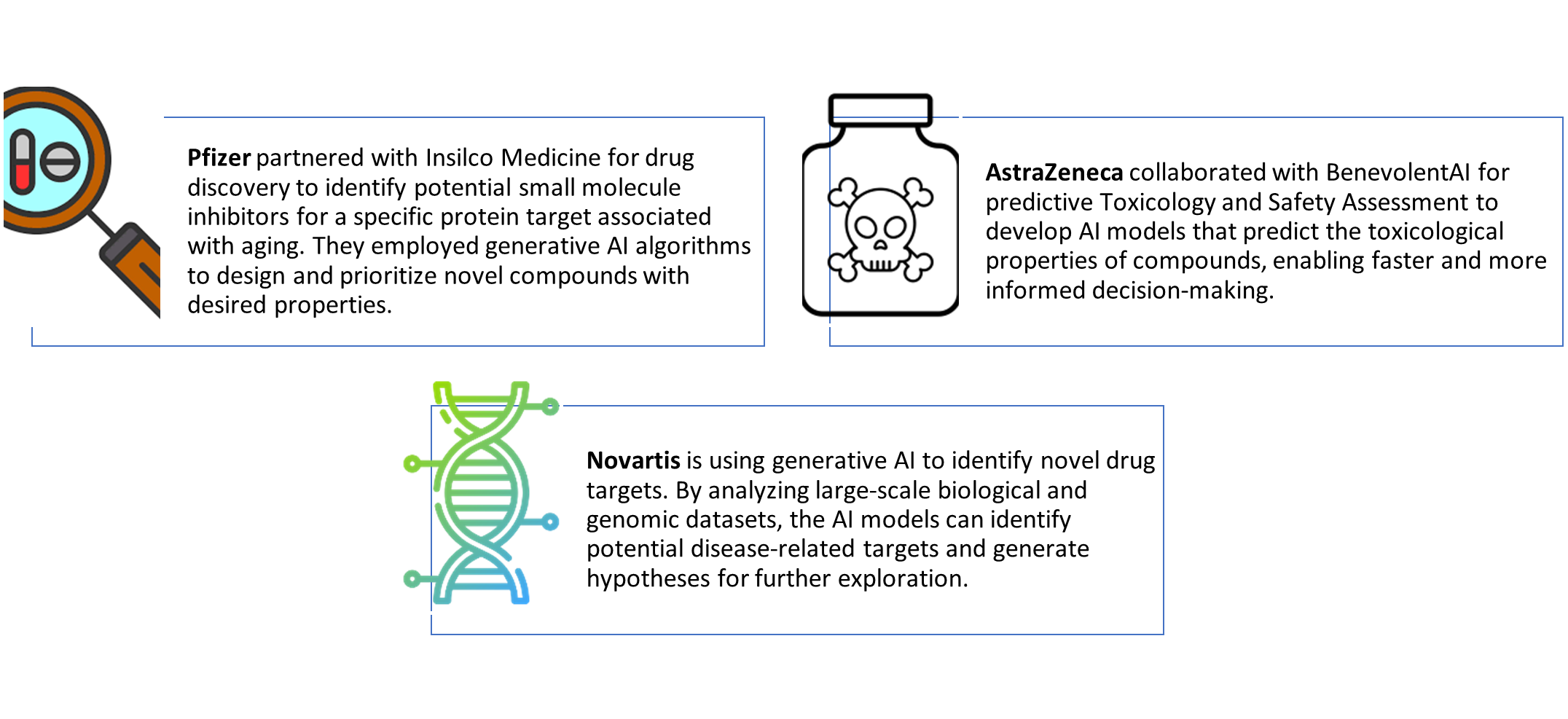The field of life sciences and healthcare is undergoing a significant transformation, fueled by advancements in artificial intelligence (AI) and machine learning (ML). One area that holds immense potential for revolutionizing life sciences is the application of generative AI.
Generative AI applications in life sciences have emerged as a transformative force, playing a pivotal role in drug discovery, genomics, and healthcare. Its complexity lies in the ability to harness machine learning models to generate novel biological sequences, predict protein structures, and optimize drug candidates. Generative AI in life sciences empower researchers to accelerate the drug development process, design tailored therapies, and gain a deeper understanding of complex biological systems, ultimately contributing to more effective treatments, personalized medicine, and improved patient outcomes.
The importance of generative AI in pharma and life sciences cannot be overstated, as it holds the promise of pushing the boundaries of our understanding and capabilities in this critical field.
In this blog post, we will explore the use of generative AI in the life sciences industry and how it can surpass the current practices, leading to remarkable advancements and breakthroughs.
Decoding Gen AI: A Game-Changer for Life Sciences
Let’s dive into the transformative realm of Gen AI and how it’s reshaping the landscape of life sciences:
Enhancing Drug Discovery
Problem Statement: Drug discovery has traditionally been a time-consuming, resource-intensive, and expensive process. It requires the synthesis and extensive trial and error testing of a vast number of potential drug candidates.
Gen AI Solution: Applications of generative AI in drug discovery can expedite the identification of potential drugs and generating novel molecular structures with desired properties. By training on large databases of chemical structures and their associated properties, generative AI models can learn the underlying patterns and generate new compounds that exhibit specific characteristics. This accelerates the drug discovery pipeline and enables researchers to identify promising candidates more efficiently, potentially leading to the development of life-saving medications in a shorter time frame.
Organizations have been quick to recognize the potential of generative AI and have been actively exploiting its applications to gain a competitive edge and improve their products in the drug discovery space.
Insilico Medicine, a leader in generative AI for drug discovery, has integrated a generative adversarial network-based AI platform into its commercial Pharma.AI platform. This innovation accelerates molecule generation, disease target identification, and clinical trial optimization and outcome prediction. Notably, Insilico created the world’s first AI-generated anti-fibrotic small molecule (INS018_055), which has advanced from Phase 0 and Phase I trials to Phase II clinical trials as of June 2023.
Predicting Protein Structures
Problem Statement: Deciphering the three-dimensional structure of proteins is crucial for understanding their functions and interactions within biological systems. Conventional methods for determining protein structures, such as X-ray crystallography and cryo-electron microscopy, are time-consuming and expensive.
Gen AI Solution: Protein structure prediction with AI is a promising solution that uses AI, ML, and deep learning algorithms. By training on a vast amount of protein sequence and structure data, generative AI models can learn the intricate relationship between amino acid sequences and their corresponding structures. This can significantly accelerate the process of protein structure determination and aid in designing more effective drugs and therapies.
AlphaFold2, crafted by DeepMind in 2021, excels at forecasting the 3D structures of proteins based on their sequences. In the realm of synthetic protein development, the two pivotal processes involve “generation,” creating fresh protein structures and sequences, and “prediction,” foreseeing the 3D structure of a given sequence.
Based on AlphaFold2 diffusion model, researchers developed “FrameDiff,” a computational tool for building new protein structures to expand protein engineering skills beyond what nature has generated. The machine learning approach produces “frames” aligned with the inherent features of protein structures, allowing it to manufacture novel proteins independently of prior designs and create novel protein structures.
Streamlining and Automating Administrative Tasks
Problem Statement: Administrative tasks in life sciences firms often involve effectively handling vast amounts of procedures, data sets, and information, utilizing resources extensively.
Gen AI Solution: Generative AI can optimize administrative workflows. It can be used to automate scheduling and resource allocation, ensuring that equipment, personnel, and facilities are efficiently utilized. Additionally, generative AI can help in automating routine tasks like data entry, report generation, or compliance documentation, freeing up time for employees to focus on more specialized or creative tasks.
Accelerating Clinical Trials by Synthetic Data Generation
Problem Statement: Clinical trials are essential for evaluating the safety and efficacy of new treatments, but they can be time-consuming and costly.
Gen AI Solution: Generative AI in clinical trials can optimize the design and recruitment process by generating synthetic data that mimic the characteristics of the target population. This synthetic data can be used to simulate different trial scenarios, allowing researchers to assess the potential outcomes and optimize trial protocols. By reducing the time and cost associated with clinical trials, generative AI can accelerate the development and approval of new therapies, benefiting patients and healthcare providers alike.
Manufacturing and Quality Control
Problem Statement: In the pharmaceutical industry, maintaining high-quality and consistent drug manufacturing is of paramount importance. However, the existing challenge lies in achieving this consistently and efficiently. Traditional methods can be resource-intensive and may not always catch issues early, potentially leading to costly errors and batch failures. Ensuring drug formulations are optimized for stability, bioavailability, and patient compliance is an intricate task that can benefit from enhanced solutions.
Gen AI Solution: Gen AI models can analyze vast amounts of manufacturing data to identify patterns and optimize production parameters. They can also detect anomalies and deviations in real-time, enabling proactive intervention and reducing the likelihood of batch failures or product recalls. Generative AI can also aid in the formulation development process, optimizing drug formulations for stability, bioavailability, and patient compliance.
Personalized Medicine
Problem Statement: In the realm of personalized medicine, the critical challenge lies in tailoring treatments to individual patients with utmost precision and efficiency. Each patient’s unique genetic makeup, clinical history, and lifestyle factors present a complex puzzle that needs to be solved to ensure the most effective therapeutic outcomes. Traditional one-size-fits-all approaches often fall short in addressing the diverse needs of patients, and the risk of adverse events and patient non-compliance looms large.
Gen AI Solution: Generative AI for personalized medicine tailors treatments to individual patients. By analyzing patients’ genetic data, clinical history, and lifestyle factors, AI models can generate personalized treatment plans and drug recommendations. This can improve treatment outcomes, reduce adverse events, and enhance patient adherence to prescribed medications. Additionally, generative AI can assist in predicting disease progression and identifying early signs of treatment resistance, enabling timely adjustments in therapeutic strategies.
Marketing and Customer Engagement
Problem Statement: The launch and commercialization of pharmaceutical products heavily relies on effective marketing and customer engagement strategies.
Gen AI Solution: Generative AI can assist in this area by analyzing large volumes of customer data, including social media interactions, online reviews, and market trends. AI-powered algorithms can generate personalized marketing content, optimize advertising campaigns, and identify key opinion leaders and influencers for targeted engagement. This can lead to improved customer engagement, better brand perception, and increased market penetration.
Organizations are already seeing a transformative effect from using Generative AI
“Generative AI Identified a novel drug candidate for the treatment of Idiopathic Pulmonary Fibrosis in 21 days as opposed to taking years with traditional methods.”
AI has become part of the business DNA for most life sciences firms. According to IDC, the global spending on AI will exceed $300B by 2026, and AI-powered automation is expected to take centerstage in the next wave of enterprise transformation.
As optimization moves from reactive to predictive and proactive, life science organizations have already started following a carefully planned maturity model to adopt AI tech in a regulated environment.
Gen AI: Augmenting Pharma Organization Maturity Model to the Next Level of Transformation

Here are a few instances of how three world’s leading pharmaceutical industries: Pfizer, AstraZeneca, and Novartis have begun implementing generative AI to maximize its benefits:

Conclusion
Generative AI holds immense potential for revolutionizing the life sciences industry. It can expedite drug discovery, predict protein structures, advance personalized medicine, enhance marketing and customer engagement strategies, and optimize clinical trials. By harnessing the power of AI and ML, life sciences researchers gain unprecedented insights, paving the way for significant strides in improving human health. As the pharmaceutical industry shifts towards developing more complex and targeted therapies, the role of generative AI will become even more critical. However, it’s paramount to approach the adoption of generative AI with ethical considerations. Ensuring responsible use is crucial to address potential ethical challenges and foster trust in the transformative capabilities of this technology.
At Hexaware, we offer a comprehensive suite of services designed to support life sciences organizations throughout their AI journey. From strategy development to implementation and maintenance, we provide end-to-end support, ensuring that organizations effectively harness the power of generative AI while addressing critical considerations such as data security, compliance, and ethical guidelines.



















